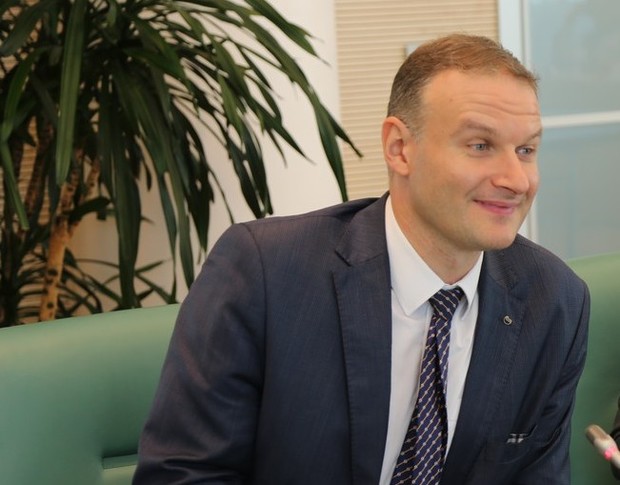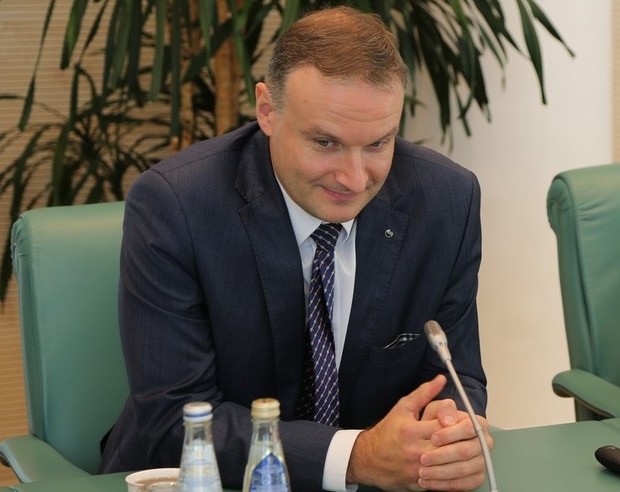Mikhail Matovnikov, Sberbank: ‘Russian economy is going through a painful transformation’
On 23 June, executive director and head analyst of Sberbank of Russia PJSC Mikhail Matovnikov visited TAIF PJSC. At the meeting with the administration of TAIF GC he presented a research of Sberbank about the key development trends of the Russian economy. In an interview with Realnoe Vremya, Mikhail Matovnikov told about the main areas of the new economic policy of Russia. It is interesting that many of these areas were already taken into account in the development strategy of TAIF GC.
'Import accounts for about 20% in GNP of Russia'
Mr Matovnikov, could you explain the reason for your visit to Tatarstan and TAIF PJSC in particular?
Sberbank does many researches on current macroeconomic trends of business development to study where to move forward. We try to deliver this information to our key clients. TAIF Group of Companies is one of these clients. We set a task to deliver the information about the opportunities to develop businesses that exist today. Nowadays we see such opportunities and want to show them to our clients.
In the development strategy of the chemical and petrochemical complex of Russia from 2016 to 2020 the stakes are at import substitution. What Russian enterprises and what products can be a good rival to European enterprises today?
Import substitution is a very important area. There are entire sectors where we import almost everything we need. This is why import substitution is needed to be developed. In my opinion, the key potential for Russian economy is connected with export. Import accounts for about 20% in GNP of Russia. If we get rid of it completely, GNP can increase by these 20%. However, taking into account that Russia's GNP accounts for just 2% of the volume of the world GNP, we can double or triple thanks to export. Blue ocean is situated there – the markets where we almost have no limits. We should note that the population of Asia is almost 4bn people, Africa has 1bn, Latin America – 600m. We have an opportunity to enter new markets and offer our products there.
And what can we offer these consumers?
We are not speaking about raw materials only. We have quite many deep-processing and very profitable products. We are already in some of these markets, but our presence is limited to wholesalers and other factors. But one can enter these markets without any help.

Not only planes or cars can be exported. In 2015, there was a growth of the Russian export of car tyres, detergents, perfumes and cosmetics.
There is a great amount of enterprises that manufacture quite competitive products according to the world standards. We just don't try to enter the world markets with these products. I've been studying the Russian non-resource export recently. I knew about a great deal of examples of when our clients entered a foreign market with absolutely untypical goods – medical face masks. Who could imagine that it is a possible export? Yes, at present the volume of this export is small, but it is growing. Not only planes or cars can be exported. In 2015, there was a growth of the Russian export of car tyres, detergents, perfumes and cosmetics. But these products were often produced in local factories of foreign producers. The export of textiles, threads, bathroom ceramics, varnish, paints is growing. Recently we financed a deal of one of the Russian producers of cosmetic cotton pads. They also successfully sell their product abroad. The opportunities have opened, many people use these opportunities.
Role of the entrepreneurial initiative
Is not Sberbank afraid to finance such investment projects? Many banks started to be careful about them during the crisis…
I would not say there is a large amount of new investment projects. It is more likely the companies that were not afraid invested in a modern product with good consumer qualities and brand earlier have had an opportunity to enter foreign markets now. Moreover, many of them invested thinking about the domestic market, but, having faced a fall in the domestic demand, decided to compensate the falling income by entering a foreign market and found out these markets were able to provide them with the further growth of production volumes and financial results. In other words, it was a blessing in disguise.
Will the reduction of the key rate of Central Bank influence the lending of enterprises?
Loan rates have got rid of the key rate to a great extent. But its current level remains quite high and continues to control lending. But we go on reducing the key rates regardless of the actions of Central Bank.
Now there are many talks about the necessity to develop the measures of the state support of business. Is this current set of measures enough or are any additional mechanism needed? What do you think?
Measures of the state support always come in handy. On the other hand, we see the majority of our very successful projects did not need the state project for some reason. I remember Monocrystal factory in Stavropol that became the leading manufacturer of artificial sapphire. Monocrystal produces glass for Apple Watch. This company was not included in Rosnano or another Russian corporation. They found such a partner themselves. They did everything on their own. Now they are our pride. So, I would not underestimate the role of the entrepreneurial initiative…

Measures of the state support always come in handy. On the other hand, we see the majority of our very successful projects did not need the state project for some reason
Recently Kazan hosted a meeting with the participation of the first vice-PM of Russia Igor Shuvalov where the creation of a 'one-stop shop' for services for small business was discussed. How will this scheme help small business promote its products?
Support of small business is one of the strategic development areas of the country. New opportunities for the Russian economy appeared in export. It refers to the sectors whose products were not possible for export, as we thought earlier. Now we export many goods, not only oil products or commodities of the defence industry – from detergents and hygiene items to sweets. At the same time small business enterprises have little information about how to start export. Our task is to help them in the creation of a client-oriented interface but also in search of markets of other countries, including the countries where Sberbank is present.
Bottom or not bottom
According to last year's data, the Russian petrochemistry did not suffer from the big decrease during the crisis due to a good conjuncture of prices for its products. How could you forecast the state of affairs in the sector in 2016?
Chemistry, in general, is one of the main beneficiaries of the crisis. It demonstrated not only the improvement of financial results but also a growth of production volumes. Such a situation was seen only in some sectors in 2015. According to the results of the first five months, we see this growth is continuing. Volumes of oil refinery have reduced a bit. But the second half of the year is ahead, and it can be temporarily more active. This is why we optimistically look at the development of our clients in petrochemistry and chemistry in general.
What could you say about the general state of the Russian economy? We've heard many times that the Russian economy overcame the 'bottom' but we have not felt any improvement yet.
The Russian economy is not on the road of recovery. It is going through a painful transformation. A part of the suffered sectors cannot think they would come back to the situation in 2013 in the short run. At the same time the sectors that had quite limited opportunities for development have new prospects. I'm convinced the transformation is largely connected with the transfer from the work in the domestic market to the expansion of foreign markets. Another task is to focus on an utmost increase of effectiveness. It is a task of rearmament, improvement of technical equipment and fight for the effectiveness at each stage.